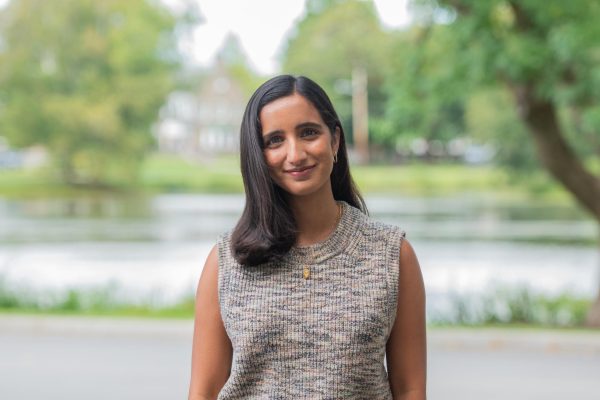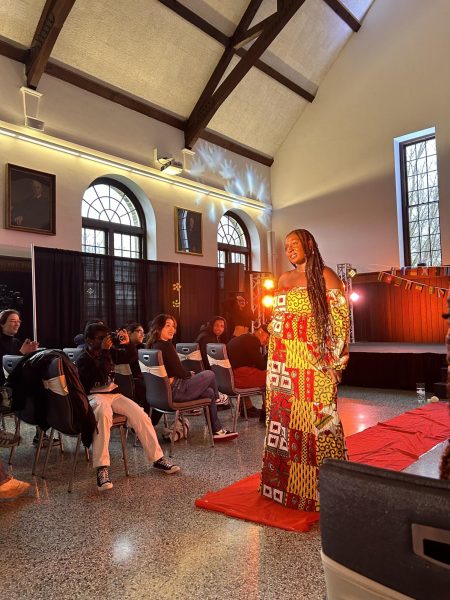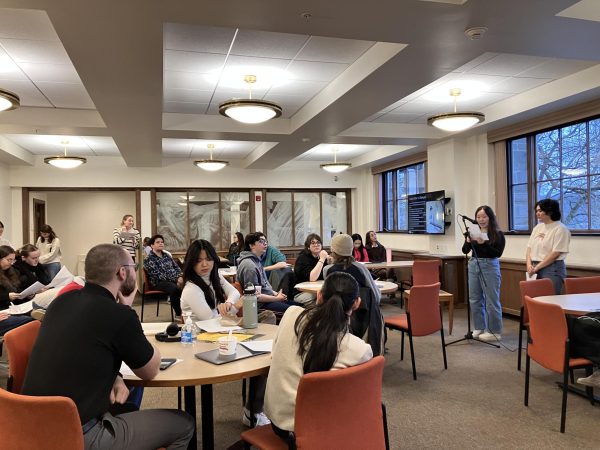Lampert Institute Sponsors Lecture on Authoritarian and Democratic Populism in China and India
The Lampert Institute for Civic and Global Affairs sponsored a lecture by Associate Professor Sanjay Ruparelia from Ryerson University in Toronto titled “A New India, A New China? The Politics of Narendra Modi and Xi Jinping.” The lecture, which took place on Wednesday, April 6 in the Persson Hall Auditorium, addressed important political intersections between contemporary India and China.
According to the Colgate website, this lecture looked to discuss “forms of authoritarian and democratic populism emerging in China and India.” In addition to that, Ruparelia also spoke on the political backgrounds of both countries, as well as the similarities and differences between leaders Xi Jinping and Narendra Modi.
Ruparelia began his talk with a comparison between India and China’s government systems – a modern constitutional democracy versus a communist regime. The professor then dove into the personal biographies of Xi and Modi and how they differ. For instance, Xi is from a political background, and his rise through the Chinese Communist Party (CCP) was not unexpected. Modi, on the other hand, comes from a more humble background. One of his first careers was as a chaiwala, selling chai in India at a train station, and he has since become the Prime Minister and a leader of the Bharatiya Janata Party (BJP), the dominant political party in India.
Ruparelia explained that there is a convergence in the political and economic contexts in which both men operate despite their different backgrounds. For instance, both leaders have tried to restructure power in their respective governments so that it is more centralized, leading Ruparelia to describe them as “party men.” For example, Xi’s leadership started with a standard transfer of power, taking a strong stance against political corruption. Eventually, this gave way to the president’s more internal changes, including suppressing constitutionalism, consolidating power to his political position, punishing political officials (including rivals) and more. Ruparelia described Modi similarly, as “concentrating [the BJP’s] power into his own hands.”
Modi’s rise to power, including when he served as the chief minister for Gujarat, paralleled an increase in popularity and success for the BJP. This was accompanied by a new political order, including (similar to Xi) a concentration and personalization of power, a weakening of the separation of powers and checks and balances systems, changes to the court systems in India and an undermining of institutional autonomy and political transparency.
The last half of the lecture included comparisons between China and India regarding the “erosion of rights and liberties,” according to Ruparelia. The professor’s more specific points under the umbrella of this topic included “targeting civil society,” “constraining media autonomy,” “the expansion of the state,” “increasing governmentality of everyday social life” and “imposing national unity and political sovereignty.” The professor explained how the two nations’ governments, under their current leadership, have seen the restriction of freedom of speech and freedom of the press. According to Ruparelia, in regards to China’s attack on lawyers and activists, “the law is being used as a tool against these groups.”
The professor also discussed the heavy monitoring of social and political messaging in both countries. Ruparelia discussed how this monitoring results in privacy and personal data concerns. One of the last points made in the lecture was about social messaging in India. Modi and the BJP have tried to redefine India as a Hindu state, pushing the narrative that India is the homeland of Hinduism. This, in turn, results in difficulties for Muslims in and outside the state.
Following the lecture, there were questions taken from the students and professors in the audience. The moderators for this part of the event were seniors Abigail Flynn and Kate Maro, both of whom are Lampert Scholars. When asked about her thoughts on the lecture, Maro said, “I definitely enjoyed the lecture. Personally, I’ve studied populism in other areas of the world, so hearing Dr. Ruparelia’s opinion on and knowledge about how populist leaders function in India and China — such significant players internationally — was very interesting.”
When asked about something that stood out to her during the lecture, Flynn said, “[I] was very interested in his discussion of populism and how populist leaders are able to gain such loyalty from their supporters so that they don’t receive much criticism for their actions, even when it’s not necessarily in the supporters’ best interest.”
To learn more about the Lampert Institute and the events they sponsor, visit the Lampert Institute for Civic and Global Affairs page on the Colgate website.

Maya Karkhanis is a senior from Hillsborough, NJ concentrating in international relations, religion, and Asian studies. She has previously served as an...







